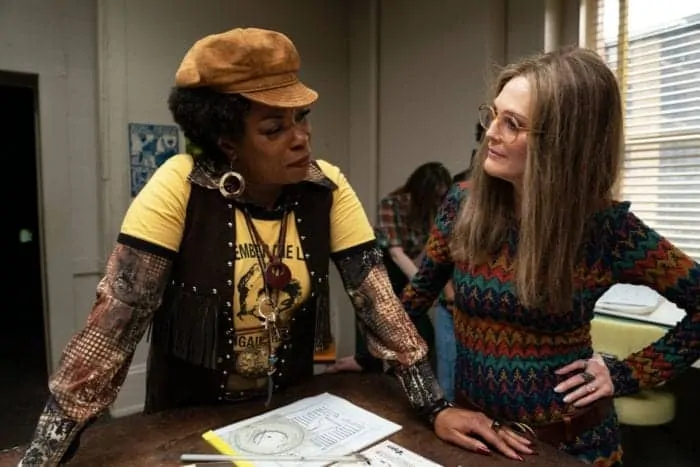Civil rights activist Gloria Steinem wrote more than a dozen books. Her memoir, “Life On The Road,” is the inspiration behind this remarkable history of the modern feminist movement and one of its most prominent leaders.
Director Julie Taymor dedicated this historical film to her mother, activist Betty Taymor, who authored a memoir entitled “Running Against the Wind.” Running against the wind also could be a description of Gloria Steinem, played by four actors whose performances illustrate how her many seasons fit together into a peripatetic life well lived.
Ryan Kiera Armstrong is young Gloria, her father’s favorite, who develops her love of travel from his frequent absences and his wonderful tales. Lulu Wilson is Gloria on the brink of adolescence, sensitive to her mother’s sadness and depression now that Ruth Steinem is a single parent.
Gloria (Alicia Vikander) is radiant as a Smith College graduate who wants to travel to India on a fellowship more than she wants to be a mother, and she is brave enough to make that happen long before Roe vs. Wade. Returning from India to New York is a cultural shock as she searches for work at a newspaper. Gloria’s transition is deep and vivid, from resourceful journalist to engaged activist who has to fend off sexual advances in the office and constant comments about how pretty she is.
One day Gloria (Alicia Vikander) is looking at sunglasses and tries on large aviator frames, for which she became known. Oh, no, said the saleswoman, you don’t want those — they’ll hide your pretty face! That’s exactly what I want, Gloria replies.
At the famous civil rights march of 1963 in Washington DC, which Gloria’s editor did not want her to cover, there were women of color who wondered why there were no female speakers on the platform — where were Ella Baker, Dorothy Height, and Fannie Lou Hamer?
Julianne Moore absolutely rocks as the journalist and civil rights activist who realizes at some point that perhaps women need a movement too. The 19th century movement with Sojourner Truth, Susan B. Anthony and Elizabeth Cady Stanton was yesterday. The activists who fought for women’s suffrage in the 1920s had to settle for much less than they wanted.
Always traveling and exploring, Gloria noted that no publication wanted to carry stories about this unsettling new feminist movement. Gloria conferred with other activists and they realized they needed to start their own publication. MS magazine sold out quickly, a hit from the very first issue in the 1970s.

Harry Reasoner on 60 Minutes issued a public apology for his early dismissal of the publication and its authors — Gloria Steinem, Bella Abzug (Bette Middler), attorney Flo Kennedy (Lorraine Toussaint), Wilma Mankiller of the Cherokee Nation (Kimberly Guerrero), and Dolores Huerta of the United Farm Workers (Monica Sanchez).
Their names are legendary now, but back then these women rented rooms in rundown hotels and conferred over electric typewriters in a swirl of cigarette smoke as they built a movement. Always Steinem sought to help people remember that much of the groundwork was done by women of color, working mothers such as Dorothy Pittman Hughes (Janelle Monae).
Steinem had to overcome her fear of public speaking and become accustomed to being interviewed by male journalists who kept commenting on her looks. She maintained her composure in the face of hostile attacks from male tv hosts and from Betty Freidan, who did not like this pretty new face at all. Witty and wistful moments occur often as the women learn to understand each other and make room for each other — African-American, Latino, Asian-American, Indigenous Nations.
Gloria Steinem’s life embodied her dad’s philosophy: “Don’t know what’s going to happen tomorrow — could be wonderful”. He also said: “Travel is the best education. The only education. Really.”
Steinem traveled on Greyhound buses for years, and it is here that director Julie Taymor has the four Glorias meet from time to time in transit, to the dismay of some critics. Perhaps Taymor borrowed from an Ingmar Bergman film technique, but the idea works. How often have you looked at various aspects of your life, not only as part of the first experience but also from hindsight years later and even decades later?
This reviewer loved her developing friendship with Wilma Mankiller, future chief of the Cherokee Nation. Mankiller and her husband presided over Steinem’s marriage. And Gloria was present as Wilma went through her final illness.
Her connection with Delores Huerta is touching. A mother of ten children, Huerta nevertheless felt women should have a choice in how many children they have, that it should be their choice and not a man’s decision. She asks, what is my church doing to help our kids?
Their finest moment — feminist activists put together the National Conference on Women in Houston in 1977. Antifeminist Phyllis Schlafly is furious that three first ladies are in attendance — Ladybird Johnson, Betty Ford and Roselyn Carter. Speakers include the widow of Rev. Martin Luther King Jr., and member of Congress Barbara Jordan.
Especially moving is the quiet appearance of Gloria at a church, introduced by the minister. She speaks to the congregation about restoring balance between men and women, between human and nature. Let there be a return to a circle, rather than maintenance of a patriarchal hierarchy.
Always for this living legend, it is about “We The People”. Somewhere early in Gloria’s memoir is a reference to a traveling feminist being a kind of celestial bartender, letting the road take her out of theory into practice. “Part of a movement that gives birth to hope,” Gloria says in a 2015 interview with the New York Times.
Indeed she was, and is. Highly recommended.


